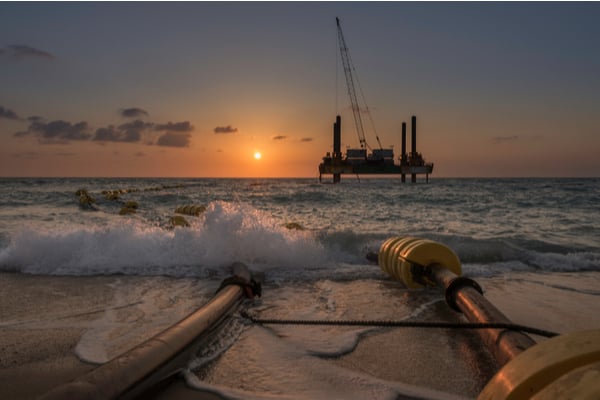Egypt is mediating Israeli-Palestinian negotiations to begin developing a gas field off Gaza’s coast.
By Pesach Benson, United with Israel
Israel and the Palestinian Authority are engaged in Egyptian-mediated talks to begin developing a gas field 36km off the coast of Gaza, according to Hebrew media reports.
According to Kan News, Israeli officials see development of the Marine gas field as beneficial, as it would alleviate Gaza’s dependence on imported diesel fuel while providing thousands of jobs in the Strip.
The Marine gas field is believed to have 32 billion cubic meters of gas — enough supply Palestinians in Judea, Samaria and Gaza, and still have a surplus available for export.
An Israeli official told Globes, “The development of Marine, similar to the agreement with Lebanon, creates a new equation in which Hamas will have much more to lose if it renews the fire.” The source added that, “A Palestinian gas field will increase the leverage of pressure on Hamas many times over.”
Europe’s energy crisis has been a major factor in pushing the talks forward, a Palestinian source told Globes. Since Russia’s invasion of Ukraine, Europe has been looking to diversify its energy sources.
“The subject has been brought up during every single visit by senior European figures to the region including during the visit of the European Commission President Ursula von der Leyen in June,” the Palestinian said.
According to the reports, if an agreement is indeed finalized, practical steps off the coast would not begin until 2024 at the earliest.
The Palestinian Authority is said to be in talks with several international energy companies, including Energean, the Greek company currently developing the Karish gas field.
The Palestinian official explained to Kan that Israel and Egypt will supervise Marine’s gas production.
The gas will then be transferred to Egypt, where it will be converted into liquified natural gas (LNG) and then exported to Europe. Israel does not have LNG infrastructure of its own.
In June, Jerusalem inked a trilateral agreement to export Israeli gas to the European Union through Egypt ports.
Gas was first discovered in the Marine field in 2000 by British Gas. Royal Dutch Shell obtained the rights to Gaza Marine when it acquired BG in 2015.
However, exploiting the find proved impossible because of Gaza’s security situation, the divided Palestinian leadership, and the legal risks of doing business with the Hamas terror organization which seized control of the Strip in 2007. As a result, Shell relinquished its rights in 2018.
Reports did not indicate how work on the field would advance if Hamas refuses to cooperate.
Technically, Israel has not relinquished its rights to the Marine field. However, in 2000, Israel allowed the Palestinian Authority, then headed by Yasser Arafat, to drill for gas and use the income.
Moreover, a Palestinian source told Turkey’s Anadolu News Agency that the Hebrew reports were “inaccurate,” saying “We will not pay Israel to extract what belongs to us.”
Earlier in October, Israel and Lebanon reached an agreement over their maritime border. At stake was the development of Israel’s Karish gas field, which Beirut claimed was in Lebanese territorial waters, and Lebanon’s nearby Qana gas field.
Proponents of the U.S.-brokered deal say it will reduce Iranian influence over Lebanon. Critics say Israel’s concessions were a capitulation to Hezbollah threats.
MAKE THE LAND OF ISRAEL EVEN MORE BEAUTIFUL!
PLANT YOUR VERY OWN FRUIT TREES IN ISRAEL!
Farmers near the Gaza border lost family, friends and workers. Spring is here, and they desperately need help to replant the farms. Join us in blessing the People and Land of Israel.
“I will ordain My blessing for you…” (Leviticus 25:4)



